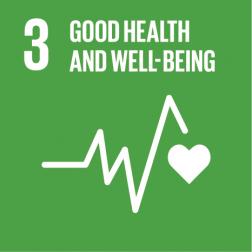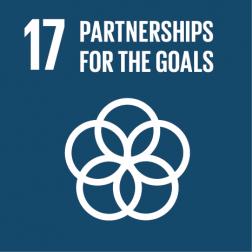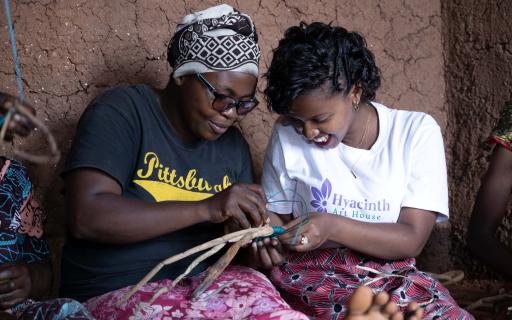In collaboration with the Belgian Institute of Tropical Medicine (ITM) in Antwerp, professor Affolabi's team studies bacterial infections and antibiotic resistance. They also install and train other diagnostic laboratories in Benin to identify bacterial infections and antibiotics resistance. Using these identification tests, doctors can prescribe antibiotics more efficiently, thus helping to combat infections and antimicrobial resistance at a larger scale. This scientific collaboration between Belgium and Benin is supported by the Belgian Development Cooperation.
Professor Affolabi's research in Benin
According to a recent international study, more than a million people die every year from antibiotic resistance, mainly in Sub-Saharan Africa. This is why scientific research and international knowledge sharing is of vital importance. Therefore, the Belgian Institute of Tropical Medicine is working with the Reference Laboratory for Mycobacteria (LRM) in Benin, a partnership that is funded by the Belgian Development Cooperation.
Professor Dissou Affolabi, an expert in microbiology at the University of Abomey-Calavi, is leading that laboratory in Cotonou, Benin. His team researches bacterial infections and antibiotic resistance. Moreover, they install and train diagnostic laboratories in Benin's hospitals to identify bacterial infections in patients, while also determining their sensitivity and resistance to antibiotics. Through these antimicrobial sensitivity tests, doctors can decide what kind of antibiotic will be most effective against the identified bacterial infection. In doing so, they can detect both infections and resistance at a larger scale, which can save countless human lives.

Antibiotic resistance as a threat to global public health
Antibiotics have existed for a hundred years now and have saved millions of lives by killing harmful bacteria. However, antibiotic resistance – also known as antimicrobial resistance (AMR) – is a global public health risk. Due to the widespread use of antibiotics, bacteria are exposed to antibiotics more frequently, which causes them to gradually build resistance against it.
This is because bacteria are living beings, fighting to survive. In order to do so, bacteria transform themselves by altering their physiological and chemical composition. In doing so, they aim to make antibiotics ineffective, in a process known as antimicrobial resistance. Humans then develop immunity to antibiotics, which makes them more vulnerable to infectious diseases. This is a serious problem, as practically no new antibiotics are being developed and tested.
The problem of antimicrobial resistance, however, is not limited to Benin or the African continent, but affects Belgium and the rest of the world, too. This is why international partnerships between medical institutions, like the one between Belgium and Benin, are crucial. They allow countries to share knowledge and find global solutions.
To combat this resistance, health workers use microscopy and cultures to identify the specific micro-organism causing the infection. Antimicrobial sensitivity tests are then used to determine which antibiotic will be most effective in combating the identified bacterium and treating the infection.
Unfortunately, the equipment and infrastructure needed for this laboratory work are very expensive, and therefore often not available. Moreover, there are almost no health workers trained to do this type of work. This limits access to effective treatments in places where resources are limited and urgent are high. This is the case for low and middle-income countries (LMICs) in particular, where there are few laboratories for clinical bacteriology. That is why professor Affolabi's work in Benin is so important: his laboratories and trainings make healthcare more accessible in the entire region.
A regional expertise center in Benin
Professor Affolabi is the director of the Reference Laboratory for Mycobacteria (RLM) in the city of Cotonou, Benin. The laboratory is part of the national tuberculosis program, for which the department in Cotonou is the central research center. In 2017, the center was officially recognized as a ‘Supranational Reference Laboratory’ (SRL) by the World Health Organization: the only one in Central and West Africa.
Since receiving international recognition, the Benin institute serves as a regional expertise center for tuberculosis and AMR research. Moreover, doctor Affolabi’s team not only conducts groundbreaking research, but also trains local health workers. In addition, it participates in international knowledge sharing, including with Belgium.

The collaboration with the ITM and Belgium
Professor Affolabi's Reference Laboratory for Mycobacteria has been working with the Belgian Institute of Tropical Medicine (ITM) since 1998. The Belgian Development Cooperation supports this partnership as part of its cooperation agreement with Benin. Together, they want to set up a national laboratory network to identify and monitor AMR, in parallel with the existing work concerning tuberculosis research. At the same time, a hundred health workers have already been trained on the origin, importance and risks of AMR.
The project's goal is twofold. On the one hand, the hospitals within this laboratory network will contribute to the World Health Organization's global system for monitoring antimicrobial resistance and use. On the other, they are developing AMR training centers to raise awareness among health personnel in Benin and other West African countries, such as Burkina Faso and Guinea. Hence, the goal is to help patients in remote and rural areas, too.
This partnership helps to expand and strengthen professor Affolabi's laboratory as well. The focus lies on diagnosis and research on tuberculosis, the detection and spread of resistance, biosafety, administrative management, quality management and reference activities at the national and international level. Furthermore, the doctorates of various members of doctor Affolabi's team have been funded through this partnership as well.

The collaboration between professor Affolabi's team and the Belgian Institute for Tropical Medicine fosters and encourages scientific research on antibiotic resistance, one of the ten most urgent threats to global public health. Hence, international scientific collaboration is of the utmost importance. The Belgian Development Cooperation invests in these international partnerships and in laboratories such as that of professor Affolabi in Benin, because the only way to tackle global challenges is together.
If you are interested in the collaboration between Professor Affolabi's team and the ITM, you can find more information here: SRL COTONOU | Laboratoire Supranational de Référence and Institute of Tropical Medicine in Antwerp | Institute of Tropical Medicine (itg.be)




